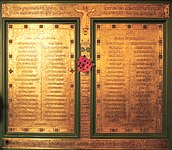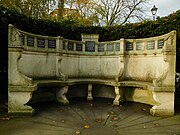St Michael and All Angels, Bedford Park
| St Michael and All Angels | |
|---|---|
| The Parish Church of St Michael and All Angels | |
 | |
 | |
| 51°29′46″N 0°15′17″W / 51.4961°N 0.2548°W | |
| Location | Bath Road Chiswick, London |
| Country | England |
| Denomination | Church of England |
| Churchmanship | Anglo-Catholic |
| Website | www |
| History | |
| Status | Parish church |
| Architecture | |
| Functional status | Active |
| Architect(s) | Norman Shaw |
| Style | Queen Anne revival Perpendicular Gothic |
| Specifications | |
| Materials | Red brick, stone facings |
| Administration | |
| Diocese | London |
| Archdeaconry | Middlesex |
| Deanery | Hounslow |
| Parish | St Michael and All Angels Bedford Park |
| Clergy | |
| Vicar(s) | Fr Kevin Morris |
| Laity | |
| Reader(s) | Anne Mower Jane Trigle |
| Director of music | Jonathan Dods[1] |
| Churchwarden(s) | Nicola Chater and Dinah Garrett |
Listed Building – Grade II* | |
| Designated | 11 July 1951 |
| Reference no. | 1079622 |
St Michael and All Angels is a Grade II* listed Church of England parish church in Bedford Park, Chiswick. It was designed by the architect Norman Shaw, who built some of the houses in that area. The church was consecrated in 1880. It is constructed in what has been described both as British Queen Anne Revival style and as Perpendicular Gothic style modified with English domestic features. Its services are Anglo-Catholic.
History
[edit]Construction
[edit]
St Michael and All Angels began as a temporary building on Chiswick High Road opposite Chiswick Lane, some distance from its present site, in 1876. The present church at the corner of Turnham Green Terrace and Bath Road, near Turnham Green tube station, was designed by the architect Norman Shaw. He was the Estate Architect for Bedford Park, designing some of its earliest houses in red brick and white-painted woodwork, known as British Queen Anne Revival style.[2] Although this style was considered novel and not particularly ecclesiastical by the architect G. E. Street at the time,[3] Shaw decided to use a similar style for the church.[2] The red bricks, as used for Bedford Park houses, were made locally.
The architectural writer James Stevens Curl describes the style as "Perpendicular Gothic with seventeenth- and eighteenth-century domestic features".[3][4] He also notes that the wooden features of the church were originally painted pale green.[5] The foundation stone was laid on 31 May 1879. The church was consecrated on 17 April 1880. A churchwarden of St Nicholas Church, Chiswick, the brewer Henry Smith of Chiswick's Fuller Smith & Turner objected in writing to the Bishop of London, raising controversy about the high Anglo-Catholic form of service used in the church. The poet and writer on English architecture John Betjeman called it "a very lovely church and a fine example of Norman Shaw's work."[2] In 1887 Shaw's vision for an additional North aisle was realised by the church's first churchwarden, the architect Maurice Bingham Adams. At the same time he added the church hall on the north side, its red brick harmonising with the church, the font, and the pulpit. Adams added the Chapel of All Souls in a more Gothic style than the rest of the church in 1909.[3][6]
Promotion
[edit]
The developer of the Bedford Park estate, Jonathan Carr, commissioned the artist F. Hamilton Jackson to create publicity images including an "iconic" one of the church, which had not even been completed at the time.[7] The development was promoted to people who had a moderate income but who had "aesthetic sensibilities". The promotion mentioned gardens, hot and cold water, schools, and "Also Church, Club (for Ladies & Gentlemen), Stores, 'The Tabard Inn', Tennis Courts, &c."[7]
War memorials
[edit]There are two war memorials, both dedicated to parishioners who died in the First World War. One is beside the main rood screen. Its design, by a "Mr. Robinson of Westminster" was announced in the Parish magazine of September 1917 to "take the form of Cavalry in oak over the choir screen", at a planned cost of around £100.[8] The rood screen memorial was unveiled on 28 September 1918, on the eve of the Patronal Feast of St Michael and All Angels. The bronze plaque with the names of the 91 fallen was completed in 1919.[8] The other memorial is just outside the church, by the church hall. It is in the form of a semi-circular stone bench, and is Grade II listed. Dedicated to the local victims of the First World War, it was designed by Inigo Triggs and completed around 1920. In the 1960s, the original nameplates were stolen, and when the memorial was re-sited in its current position, engraved stone replacements were installed.[9][10] In June 2021, some of the replacement nameplates were again stolen.[11]
Restoration
[edit]The church's roof and stained glass windows were seriously damaged by a Second World War bomb which destroyed the nearby Chiswick Polytechnic. The East Window was filled with new stained glass by Lawrence Lee in 1952. The church's exterior and roof were restored in 1980.[2] In 2013 the bishop of London celebrated the completion of a 5-year project to replace the church organ. The new organ, which has 1667 pipes and 25 stops, was made by the Swiss company La Manufacture d'Orgues St Martin.[12]
Present day
[edit]On 11 July 1951, the church was designated a Grade II* listed building.[13]
The church is within the Anglo-Catholic tradition of the Church of England.[2]
-
The South front, on to Bath Road
-
Southeastern corner in autumn light
-
Church hall adjoining the church
-
Entrance
-
Nave with choir practice
-
First World War memorial beside the main rood screen
-
External semicircular stone war memorial by Inigo Triggs, c. 1920
References
[edit]- ^ People: Director of Music
- ^ a b c d e "A brief history of the Church". St Michael & All Angels. Retrieved 19 November 2015. This is based on Broom, Michael. The Birth of A Parish – The Creation of St Michael & All Angels, Bedford Park. St Michael & All Angels.
- ^ a b c "Richard Norman Shaw: Churches". Victorian Web. Retrieved 19 November 2015.
- ^ Curl, James Stevens (1990). Victorian Architecture. David & Charles. cited by Victorian Web.
- ^ Curl, James Stevens (1995). Victorian Churches (English Heritage). Batsford. p. 105. ISBN 978-0-713-47491-6.
- ^ Grant, Sandra. "Architecture and architects". The Bedford Park Society. Retrieved 11 October 2019.
- ^ a b "St Michael's in Health & Architecture exhibition". St Michael and All Angels, Bedford Park. 11 October 2018. Retrieved 11 August 2021.
- ^ a b "The Parish Memorial". Official website (World War I Project). Retrieved 11 November 2017.
- ^ Historic England. "Bedford Park War Memorial (1422868)". National Heritage List for England. Retrieved 19 October 2017.
- ^ "The Bedford Park Memorial Seat". Official website (World War I Project). Retrieved 11 November 2017.
- ^ "Several plaques with names of First World War dead removed". Chiswick W4. 6 June 2021. Retrieved 6 June 2021.
- ^ "Bishop of London celebrates new organ at St Michael and All Angels, Bedford Park". Chiswick Herald. 27 September 2013. Retrieved 6 December 2015.
- ^ Historic England. "Church Of St Michael and All Angels (1079622)". National Heritage List for England. Retrieved 9 July 2016.
External links
[edit]- Anglo-Catholic church buildings in the London Borough of Hounslow
- Diocese of London
- Churches completed in 1880
- Richard Norman Shaw buildings
- World War I memorials in England
- Churches bombed by the Luftwaffe in London
- 19th-century Church of England church buildings
- Grade II* listed churches in London
- Grade II* listed buildings in the London Borough of Hounslow
- Grade II* listed monuments and memorials











